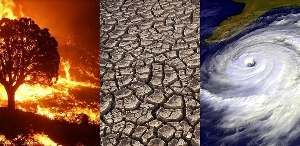One of our gut-wrenching features, as a country, is our exclusive focus on political discussions. Given that ensuring good health is a quintessential way of ensuring longevity of our existence, it is important that we inject issues about climate change and air pollution into our discussions.
A bit of politics, a bit of climate change, I mean. In other words, as we incessantly and passionately immerse ourselves in political discussions, we need to remind ourselves, the need to passionately discuss issues on climate change and its impact on health as well.
According to the WHO and other international organisations, climate change poses a plethora of risks on the health of people. From this perspective, it is unsurprising that the impact of climate change on planetary health has gained prominence in academic and policy discussions.
However, discussions on climate change and how it negatively affects the health of people are scarce in Ghana. Unfortunately, we sleep for only 6 hours and spend 18 hours discussing politics – NPP-NDC prepotence, unnecessarily thinking of which one is losing the next elections and which one is winning, ignoring the all-important climate change and its impact on health.
This makes one wonder if we are indeed serious as a nation. A country plagued with the issue of air pollution, especially Accra, the capital, should make the health impact of climate change a priority.
As far as I can anachronistically decipher, the capital had a palpably terrible air quality early last year, with air pollution estimated to be almost twice as terrible as air pollution in Delhi. Why should such a country ignore climate change and health issues and incessantly discuss political issues?
Of course, political discussions are necessary, but if the current trend continues, there can be pollution crisis in the whole country, not only in Accra, especially now that we have started experiencing the burning of shops and bushes. All that FM and TV Stations in the country do is devote hours for unnecessary political talks, yet, do not devote 2-3 minutes to discuss climate change and its health risks.
The implication of the above is that we have completely lost touch with reality, erroneously thinking that we can achieve development by focusing exclusively on politics. While there is no doubt that air pollution can cause pregnancy losses, bronchitis, asthma and pneumonia, we need to constantly remind ourselves that it can additionally impact negatively on food security and mental health, a testament to the untrammelled need to strike a balance between political discussions and discussions on climate change and its impact on health.
This is particularly true in the sense that scholars, analysts and development think-tanks concur that discussions on climate change and its impact on health can help in disseminating the requisite information in triggering pro-climate action inasmuch as they can instigate and sustain behavioural change needed to ameliorate the climate crisis in the world.
Furthermore, that we facilely ignore climate change and shift all our attention to political discussions go a long way to reinforce the fact that we have short memory as a people. Sadly, and rather curiously, we have the ignoble proclivity for meddling in unprofitable ventures.
We have, since time immemorial, devoted most of our time to discussing political issues. What have we achieved from that? Nothing. Just the exhibition of hard-core subterfuge, nepotism and grandiose pomposity from our politicians.
My without-mincing-words contention here is that both the NPP and NDC have failed us: terribly low level of development, bigotry and conflict among some Ghanaians. It is not my intention to inform people not to talk about them. What I want us to bear in mind is that it is not factually incorrect that discussions on climate change and its health impact are significant to development as political discussions are.
As a country with weak healthcare system, it is incumbent upon us to hold incessant discussions on climate change and its impact on health, just as we hold political discussions. That can go a long way to help save us from the negative effects of air pollution and its consequence of over-stretching our already weak healthcare system. What will it profit us to exclusively immerse ourselves in political discussions and get infected with air pollution-related diseases?
Opinions of Friday, 10 January 2025
Columnist: Kwabena Aboagye-Gyan















